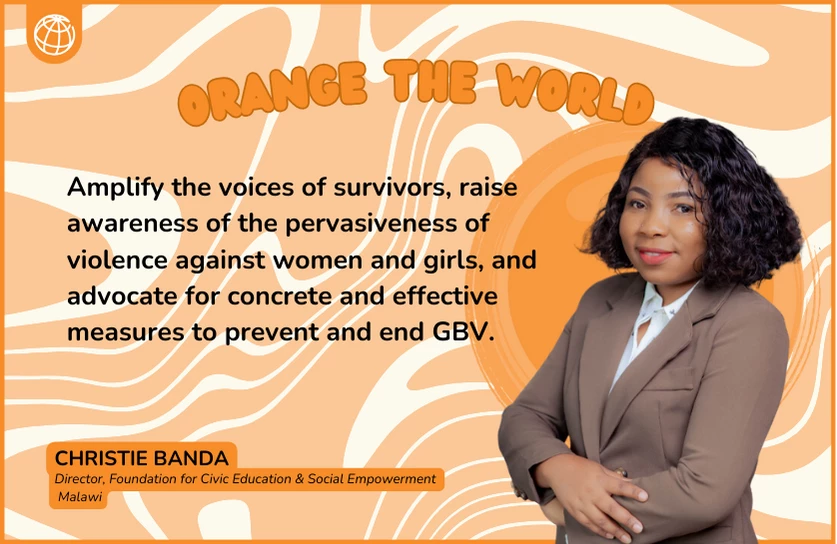Increased concerns on issues of violence against women and girls globally have been exacerbated by the COVID-19 pandemic and the current multitude of disasters.
Statistics so far have shown that when you are a woman, no amount of education, race, money, or religion can shield you from the risk of GBV. A twist we did not expect or think through in terms of vulnerability and exposure to violence against women and girls is the onset of so many disasters.
In my country of Malawi, the situation is dire, with one in two women reporting experiencing physical or sexual violence in their lifetime according to UN Women. Now, think about this, as bad as these statistics are, it gets worse because of the increase in the frequency of disasters. Disasters often lead to displacement, disruption of social norms, and increased poverty, all of which can exacerbate existing risks of violence against women and girls. In Malawi, for example, Cyclone Idai in 2019 and the subsequent floods left thousands of women and girls homeless and without protection, making them more susceptible to sexual assault and other forms of violence.
The most recent cyclone Freddy that intensified in March, 2023 led to 86,604 households being displaced, 445 people dying, with 282 missing, and 918 sustaining various injuries. Among them lies the terrible event of a young 12-year-old girl who was subjected to acts of sexual violence by her own father during Cyclone Freddy. When the cyclone hit, the father of the girl took her under his care promising her care, safety, and security. The news shocked everyone when it came out through one of the Women-Led Organization safe space sessions - the girl reported being sexually abused by her father.
Malawi has a number of policies in place to curb violence against women and girls. The Sexual Offences Act (2016) for example, strengthens the legal framework for protecting women and girls from sexual violence, including increased penalties for offenders and improved support for victims. Thanks to such policies, the 39-year-old father was sentenced to 20 years imprisonment with hard labor for having sexual intercourse with a minor contrary to Section 138 of the Penal Code. Though justice may be served for the girl, the indelible trauma she endured cannot be undone. Her story is but one of countless harrowing accounts of violence and abuse that women and girls face in relief camps and communities during and after disasters, with many unable to seek recourse.
The heightened economic challenges in Malawi are making it difficult for women and girls to escape abusive relationships. Accessing justice for victims/survivors of violence has some financial consequences, for example, being able to hire a lawyer or access the courthouse is something that most women cannot afford. In cases where some non-profit organizations assist in providing such support, financial dependency makes it difficult for most women and girls to retaliate against their abusers because this usually backfires and they tend to receive a lot of backlash from the community. Indeed, domestic violence is the most common form of violence against women and girls (VAWG) in Malawi. According to a 2020 survey by UNICEF, 42% of women in Malawi have experienced physical violence from a partner at some point in their lives. This is significantly higher than the global average of 27%.
This year’s theme for International Day for the Elimination of Violence Against Women UNITE! Activism to End Violence Against Women & Girls, provides an opportunity for GBV activists such as myself (and you too!) to amplify the voices of survivors, raise awareness of the pervasiveness of violence against women and girls, and advocate for concrete and effective measures to prevent and end GBV . Specifically, Women-Led Organizations (WLO) have the advantage to build coalitions for social justice for women and girls in order to create a more united front against all forms of violence and discrimination and are also well-positioned to advocate for the inclusion of women and other vulnerable groups in DRR and humanitarian planning and decision-making processes. They are essential partners in building a resilient world.
WLOs play a critical role in connecting GBV survivors with essential services, including medical care, psychosocial support, and legal assistance. In Malawi, WLOs have been instrumental in providing case management trainings to first responders of GBV during emergencies and in facilitating mobile courts and care for survivors. The supportive legal frameworks and environment empower GBV WLOs to expand their reach and impact.
The localization agenda, with its emphasis on power sharing, presents a golden opportunity for local organizations in Malawi to demand and utilize existing resources for development and humanitarian work, ensuring the sustainability of their endeavors. For the affected populations, this localization translates into humanitarian aid that is more relevant, culturally sensitive, and sustainable.
The international community bears a crucial responsibility in addressing GBV in Malawi. Donors must provide robust financial and technical support to local organizations actively working on this pressing issue. Additionally, they must hold the Malawian government accountable for adhering to its commitments to reducing violence against women and girls.



Join the Conversation